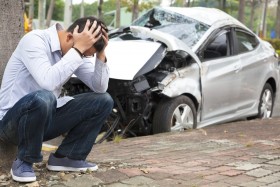Coping With Car Accident PTSD & Trauma

After being in a car accident, one of the first things people are concerned with is getting medical attention for any physical injuries they received in the accident. Getting your physical injuries taken care of should, indeed, be your top priority, people all too often overlook taking care of the psychological trauma that can come with being in a car accident. Psychological damage is every bit as important as physical damage.
Car accidents are incredibly common; more than 6 million of them occur every year. But everyone reacts differently to being in a car accident. While some people may have no problems getting right back behind the wheel, it’s perfectly normal to feel shaken up after a car accident. You might keep replaying the incident over in your head or feel nervous about driving or being a passenger in a car. Some people have nightmares about their accidents or have problems sleeping. In other cases, a person might seem fine immediately following the accident, but develop signs of trauma after some time has passed. In most cases, these types of feelings fade after a couple of weeks.
If you feel like you’re not moving on the way you thought you would, you’re not alone. As many as 40% of people who have been in car accidents are traumatized to the extent that it turns into post-traumatic stress disorder (PTSD). If it’s been several weeks or a few months since your accident and you’re still having psychological issues stemming from your accident, you may be suffering from PTSD.
Since PTSD is most commonly associated with veterans returning from war and people who have survived natural disasters, car accidents are often considered an overlooked trigger of PTSD. Not only can the accident itself be traumatic, but if the car accident results in a legal battle, having to discuss the accident so often can make it more difficult to move on.
Symptoms of Car Accident PTSD
PTSD can result in symptoms such as insomnia, irritability, severe anxiety or panic attacks, fatigue, muscle tension, stomach problems, increased heart rate. These types of symptoms are not only very difficult to deal with physically, they can leave people feeling socially isolated or interfere with your life at home and at work.
How to Deal With Car Accident PTSD
A car accident may be part of your past, but it doesn’t have to dominate your future. Therapy can be very helpful in moving on with your life after an accident. Cognitive-behavioral therapy can be a very effective type of therapy for treating PTSD after a car accident, but other types of therapy might work better for some people. You also might be interested in joining a support group for people trying to cope with PTSD.
If you’re struggling to cope with trauma after an accident, but haven’t reached the level of PTSD yet, taking good care of yourself can be very helpful. Do your best to maintain your usual daily routines. Make sure you are getting plenty of rest and eating well. Get regular exercise as long as doing so won’t interfere with any of your injuries. Talk with your friends, family, doctor, or a counselor about the accident if you feel the need to.
Help With Michigan Car Accidents
When you’ve been injured in a car accident, it’s very important to make sure you get all of the care you need, both physically and emotionally. The Michigan car accident lawyers at Goodwin & Scieszka understand how deeply traumatic these events can be and will fight for you to get the compensation you’re entitled to. Contact us so that we can learn more about your case.






